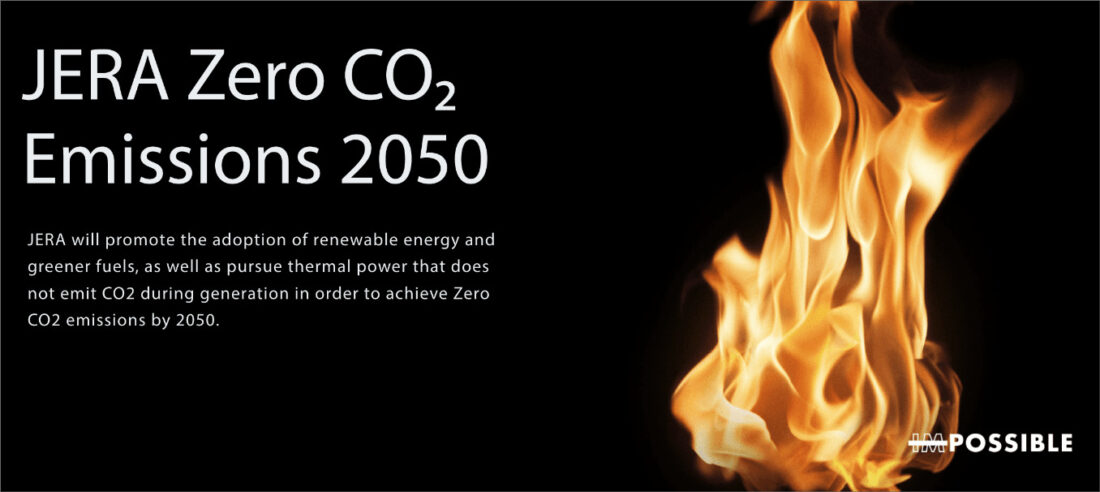On October 5, Kiko Network and the Japan Environmental Lawyers Federation (JELF), a group of lawyers working on environmental issues, filed a petition to the Japan Advertising Review Organization (JARO) requesting a recommendation to cease JERA’s “Zero CO2 Emission Thermal Power Generation” advertisements and refrain from future similar advertisements, on the grounds that such advertisements violate Japan’s Act against Unjustifiable Premiums and Misleading Representations. JARO’s opinion on the petition that JERA’s ads are “greenwashing” is currently being awaited.
*JERA is Japan’s largest electric power company, a key figure in Japan’s decarbonization policy. JARO is an organization which works to ensure fair advertising and labeling practices in Japan.
What is “Greenwashing”?
Greenwashing is the creation of a misleading environmentally friendly image, or the inaccurate pretense of being environmentally conscious. Advertisements that claim actions or products to be environmentally friendly when in fact they are not, or where the actual facts are unclear, provide potentially false information and may give viewers and consumers inaccurate impressions. In Europe, the European Commission announced the “Green Claims Directive” in March of this year, and restrictions on greenwashing, including the requirement that companies substantiate environmental claims with scientific evidence, are being strengthened. Additionally, lawsuits seeking injunctions or changes to advertisements are steadily increasing in Europe and the United States.
JERA’s problematic advertisements
The subject of this petition is JERA, a joint venture between Tokyo Electric Power Company Holdings (TEPCO) and Chubu Electric Power Company, which advertises ammonia-fired power generation as “Zero CO2 Emission Thermal Power Generation”. Kiko Network and JELF have pointed out that these claims are a violation of a number of regulations and laws, including the Act Against Unjustifiable Premiums and Misleading Representations.

In addition to the advertisement pictured above, you can see various JERA’s “Zero CO2 Emission Thermal Power Generation” ads on trains, while watching professional baseball games, and even in TOHO Cinemas movie theaters.
Why using ammonia in power generation is problematic
To advertise its efforts to achieve net zero CO2 emissions by 2050, JERA widely broadcasts TV commercials and online ads that promote the use of ammonia as a fuel, claiming that it doesn’t emit CO2 when burned. However, most of the hydrogen and ammonia that will be used will be produced from fossil fuels, which emits CO2 during the production of the hydrogen or ammonia. Therefore, as long as the hydrogen and fuel ammonia is produced directly or indirectly from fossil fuels, it is inaccurate to label them as “zero emission” or “CO2-free”.
Ammonia co-firing (with coal) is included in the Japanese government’s energy strategy, and has also been widely criticized as leading to the prolongation of the life of coal-fired power plants and lacking economic rationality.
The problems with JERA’s advertisements
- Ammonia emits large amounts of CO2 in its production and transportation processes
In the ads, JERA makes claims like “Zero CO2 Emission Thermal Power Generation,” or “a new energy source that replaces fossil fuels, ammonia that does not emit CO2 when it is burned”. However, JERA does not mention anything about how such large amounts of ammonia will be produced, or about the CO2 emitted from production and transportation. How can JERA achieve actual zero CO2 emission thermal generation through these methods? - Lack of details and explanation of risks
JERA aims to achieve 20% ammonia co-firing by 2030 and 100% full-firing by 2050, but no details regarding the actual plan, scale, and methods of implementation have been disclosed. There is no explanation regarding the progress of the ongoing demonstration experiment at the Hekinan Thermal Power Plant in Aichi Prefecture. When can JERA actually achieve true “zero emission” thermal power generation? JERA has yet to show any concrete measures to achieve the CO2 emission reductions needed. From what we know, JERA’s plan may only result in the preservation of coal-fired power plants. - Dependency on expensive CCS
There is an idea that the CO2 emitted during the production of hydrogen and ammonia could be offset by utilizing Carbon Capture and Storage (CCS). However, the cost of CCS is extremely high, and the feasibility of the technology is questionable. And even if it were achievable, who would bear the cost? After spending taxpayers’ money on development of CCS under national policies, will the cost of continuing to generate electricity using fossil fuels just be passed on to consumers’ electric bills?
To promote measures that are actually environmentally friendly, accurate information is necessary. However, currently there are no legal regulations in Japan regarding greenwashing. Consumers and citizens must already be aware enough in order to not to be tricked by inaccurate advertisements. We must thoroughly check for greenwashing and hold those responsible accountable, and also demand evidence-based explanations from businesses (advertisers).
Related Links
【Press Release】JERA’s Ad “Zero CO2 Emission Thermal Power Generation” is a Climate Greenwash – Filed Recommendation for exclusion(October 5, 2023)(Link)

